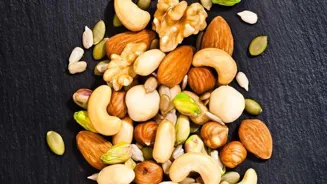Unveiling the Health Secrets of Nuts: A Nutritional Powerhouse. Dive deep into the benefits for a healthier you!
In a country obsessed with samosas and jalebis, it's easy to forget the humble nut. Often
relegated to a mere snack, nuts are nutritional powerhouses packed with goodness.
From almonds to walnuts, cashews to pistachios, these crunchy delights offer a plethora of health benefits that deserve a closer look. So, let’s crack open the nut and see what secrets they hold for a healthier you.
Nutrition is key for good health; nuts are nutrient-rich
The importance of nutrition cannot be overstated. A balanced diet is the cornerstone of good health, providing the body with the essential nutrients it needs to function optimally. Nuts, in this context, are not just convenient snacks but contribute significantly to our nutritional intake.
They are sources of protein, healthy fats, vitamins, and minerals which are essential to keep our body healthy.
Nuts are calorie-dense but healthy with good fats, protein, and fiber
Nuts are calorie-dense, yes, but don't let that scare you away! The calories come from healthy fats, primarily monounsaturated and polyunsaturated fats, which are good for your heart.
These fats help lower bad cholesterol (LDL) levels and raise good cholesterol (HDL) levels, reducing the risk of heart disease. Nuts are also a good source of protein, which is crucial for building and repairing tissues.
Plus, they are loaded with fiber, which aids digestion and keeps you feeling full, preventing overeating.
Nuts are rich in minerals and vitamins, each offering unique health benefits
Minerals like magnesium, potassium, and calcium are abundant in nuts, contributing to bone health, nerve function, and blood pressure regulation. Vitamins, especially vitamin E, found in almonds, act as antioxidants, protecting your cells from damage.
But each nut has its spotlight, like walnuts boosting brain function for studies, or Brazil nuts which is a selenium king.
Dietary changes with nuts can prevent heart disease in India
Cardiovascular disease is a major health concern in India, and dietary changes can play a crucial role in prevention. Nuts are your allies in this battle. The healthy fats in nuts, as mentioned earlier, improve cholesterol levels.

They also contain L-arginine, an amino acid that helps improve blood vessel function. Additionally, nuts are rich in antioxidants, which combat inflammation, a key factor in heart disease.
Regular nut consumption lowers heart attack and stroke risk
Regular consumption of even small amounts of nuts has been linked to a reduced risk of heart attacks and strokes. Studies have shown that people who eat nuts regularly have a lower risk of developing heart disease compared to those who rarely consume them.
The fiber and minerals in nuts also contribute to healthy blood pressure levels, and help in overall cardiovascular health, making them a smart addition to your diet.
Nuts, especially walnuts, boost brain health with omega-3
Want to sharpen your mind? Reach for a handful of nuts! Walnuts, in particular, are known as "brain food" due to their high omega-3 fatty acid content. These essential fats are crucial for brain health and cognitive function. Omega-3s help improve memory, focus, and overall brain performance.
Almonds and cashews boost brain health with vitamins and minerals
Other nuts, such as almonds and cashews, also contribute to brain health. Almonds contain vitamin E, an antioxidant that protects brain cells from damage. Cashews are a good source of magnesium, which is essential for nerve function and may help improve mood and reduce anxiety.
Including a variety of nuts in your diet can help keep your brain sharp and functioning at its best.
Nuts aid weight management due to satiating properties
Despite being calorie-dense, nuts can actually aid in weight management. This might seem counterintuitive, but the key lies in their satiating properties.
The combination of protein, fiber, and healthy fats in nuts keeps you feeling full for longer, reducing the likelihood of overeating or snacking on unhealthy foods.
Eating nuts can lower BMI, regulate blood sugar, and curb hunger
Studies have shown that people who eat nuts regularly tend to have a lower body mass index (BMI) than those who don't. Nuts also help regulate blood sugar levels, preventing energy crashes and cravings.
Snacking on a small handful of nuts between meals can curb hunger and help you stick to a healthy eating plan.
Nuts beneficial for diabetes due to low glycemic index
For people with diabetes, managing blood sugar levels is crucial. Nuts can be a valuable addition to a diabetic diet because they have a low glycemic index (GI). This means that they don't cause a rapid spike in blood sugar levels after consumption.

Nuts improve blood sugar control in diabetes with fiber & healthy fats
The fiber and healthy fats in nuts help slow down the absorption of sugar into the bloodstream, preventing blood sugar swings. Almonds, walnuts, and peanuts have all been shown to improve blood sugar control in people with diabetes.

However, it's important to consume nuts in moderation and choose unsalted varieties to avoid excess sodium intake.
Snack Smart
Keep a small container of mixed nuts at your desk or in your bag for a healthy and satisfying snack. A handful is all you need.

Breakfast Boost
Add chopped nuts to your morning oatmeal or yogurt for added protein, fiber, and flavor.
Salad Sensations
Sprinkle toasted nuts over salads for a crunchy and nutritious topping.
Cooking Companion
Use crushed nuts as a coating for baked vegetables or tofu for added texture and flavor.
Nutty Spreads
Opt for natural nut butters (almond, peanut, cashew) instead of processed spreads.
Nuts are natural, tasty, and nutritious
Nuts are natural, tasty and nutritious as they are rich in vitamins and minerals.
Nut allergies are common; avoid nuts for safety
While nuts offer numerous health benefits, it's important to be aware of potential allergies. Nut allergies are among the most common food allergies and can cause severe reactions. If you have a known nut allergy, it's crucial to avoid all nuts and nut-containing products.
Consume nuts in moderation for health benefits
Even if you don't have an allergy, it's important to consume nuts in moderation due to their high calorie content. A small handful (about an ounce) per day is generally recommended. Also, choose raw or unsalted nuts whenever possible to avoid added sodium.
Natural, vitamin and mineral-rich content for a healthy diet
The content is natural, vitamins rich and minerals rich and it help in making healthy diet.
AI Generated Content. Glance/InMobi shall have no liability for the content














